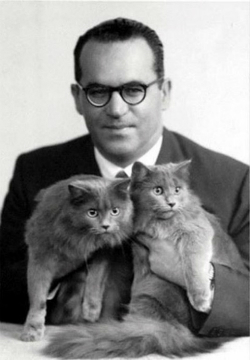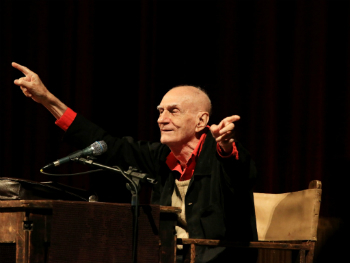Georg Wilhelm Friedrich Hegel (1770-1830) was an idealistic German philosopher who opened new fields of study in History, Law, Art, among others, through his postulations and dialectical logic.
Hegel's thought influenced thinkers such as Ludwig Feuerbach, Bruno Bauer, Friedrich Engels and Karl Marx.
Biography
Hegel was born on August 27, 1770, in Stuttgart, Germany. He was the eldest of three brothers, children of a civil servant in the duchy of Württemberg. He studied at home with tutors and his mother, but also at the local college, where he remained until he was 17 years old.
He learned Latin with his mother, in addition to studying Greek, French and English and very early had contact with the Greek and Roman classics. Despite his solid humanist education, Hegel had an excellent scientific background. He lost his mother at age 13, and was taken care of by a sister, Cristiana.
With his father's encouragement, in 1788 he entered the seminary at Tübingen University to become a pastor. Among his companions were the philosopher Friedrich Wilhelm Joseph von Schelling (1775-1854) and the poet Friedrich Hölderlin (1770-1843).
When Hegel was 18 years old, the Bastille fall, and later the events that would make up the French Revolution. Among the consequences of this historical event is the subsequent invasion of Prussia by the French army.
At that time, Germany was not organized as a unified state, being a conglomeration of duchies, principalities and counties.

In 1793, he begins to act as a private tutor in Bern, Switzerland. The following year, on the advice of Hölderlin, he began to analyze the writings of Immanuel Kant (1724-1804) and Johann Fichte (1762-1814).
Together with Schelling, Hegel wrote "The Oldest Program of a System of German Idealism". Among the ideas in the work is that the State is purely mechanical.
That is why it is necessary to transcend the State and free men must be treated as part of the machinery that allows it to function.
Hegel leaves tutoring in 1779, and starts living on his paternal inheritance. From 1801, Hegel went to work at the University of Jena, where he remained until 1803, in Schelling's company.
During the period he taught in Jena, Hegel exhausted the legacy left by his father and went to work at the Catholic-oriented newspaper Bamberger Zeitung, in Nuremberg. At this stage of life, he gets married, has three children and continues his studies in Phenomenology.
While living in Nuremberg, Hegel published several fascicles of the "Science of Logic" in the years 1812, 1813 and 1816. From 1816 onwards, the philosopher accepted to be a professor of philosophy at the University of Heidelberg.
He died in Berlin on November 14, 1831, victim of a cholera epidemic.
Philosophy
Hegel's philosophy can be understood through his main work “The Phenomenology of Spirit”, written in 1807.
It is an introduction to the logical system created by Hegel which comprises three parts: Logic, Philosophy of Nature and Philosophy of Spirit.
This book intends to overcome the duality between the knowing subject and the cognitive subject and thus bring it closer to the Absolute, the Absolute Idea, the Truth.
To reach the Absolute, man needs to question his certainties and on this path of doubts, he will be ready to think philosophically and then, to know the Absolute.
The Absolute acts through man and manifests itself in man's desire to know the truth. In this way, the more the subject knows himself, the closer he is to the Absolute.
For Hegel, everything that can be thought of is real and everything that is real can be thought of. There would be, a priori, no limit to knowledge, insofar as rationalization can be carried out through the dialectical system.
Dialectic
Dialectics is a philosophical concept that is used by many thinkers. THE Plato's dialectic, for example, would be a form of dialogue where it was possible to obtain knowledge.
Hegel points out that every idea – thesis – can be challenged through a contrary idea, the antithesis.
This dispute between thesis and antithesis would be the dialectic. Thus, the process is governed by a dialectical logic. However, far from harming thesis, the discussion between two opposing ideas would give rise to a synthesis that would be an improved idea.
The dialectical method proposed by Hegel includes the notion of movement, process or progress to arrive at the result of the conflict of opposites.
These ideas would be taken advantage of by later philosophers as Karl Marx and Friedrich Engels.
Hegel x Marx
If for Hegel what makes the world move are ideas, Marx will say that it will be the class struggle and production relationships.
This is because Marx was a materialist philosopher who took into account the material conditions of human life, of everyday survival.
Thus, History would be moved by the action of those who do not have the means of production to reach a higher position.
In a way, we can say that Hegel's dialectic was on the plane of ideas and the unrealizable. As Marx, he sought to adapt the dialectic to the real world.
Hegel's Phrases
- "The task of philosophy is to understand what reason is."
- "Nothing great has been accomplished in the world without passion."
- "Reality is rational and all rationality is real."
- "The general need of art is the rational need that leads man to become aware of the inner and outer world and to enjoy an object in which he recognizes himself."
- "History teaches is that governments and people never learn from history."
- “Whoever wants something big must know how to limit himself. Who, on the contrary, wants everything, nothing, in truth, wants and gets nothing.”
Construction
- Phenomenology of Spirit (1807)
- Philosophical Propaedeutics (1812)
- Science of Logic (1812-1816)
- Encyclopedia of Philosophical Sciences (1817)
- Principles of Philosophy of Law (1820)
read more:
- Contemporary Philosophy
- Philosophical Idealism
- historicism
- What is Philosophy?
- Soren Kierkegaard
- Arthur Schopenhauer
- Immanuel Kant
- Kant's Ethics and the Categorical Imperative
- Brazilian Philosophers You Need to Know
- Edmund Husserl's Phenomenology
- The most important philosophers in history



